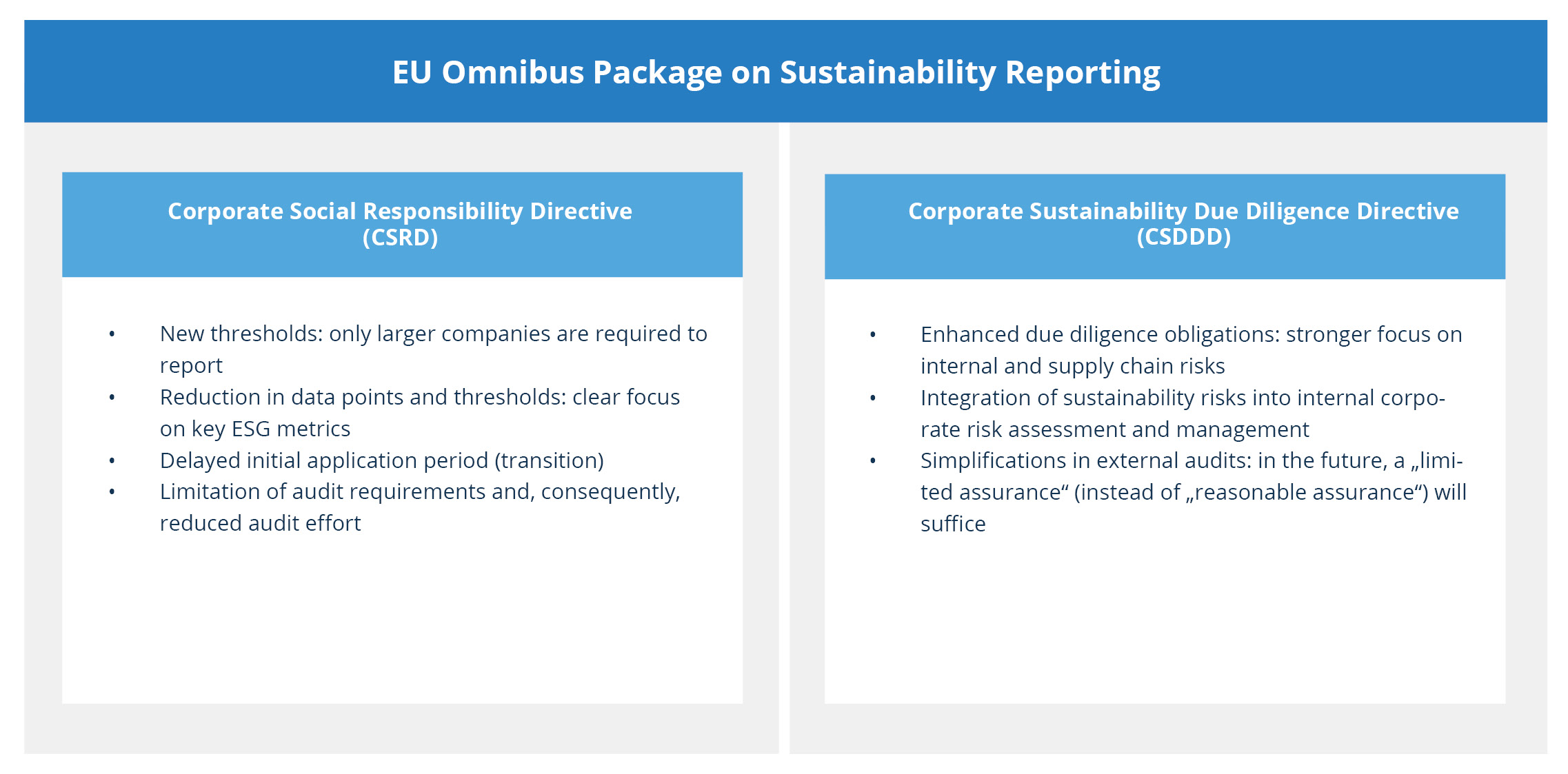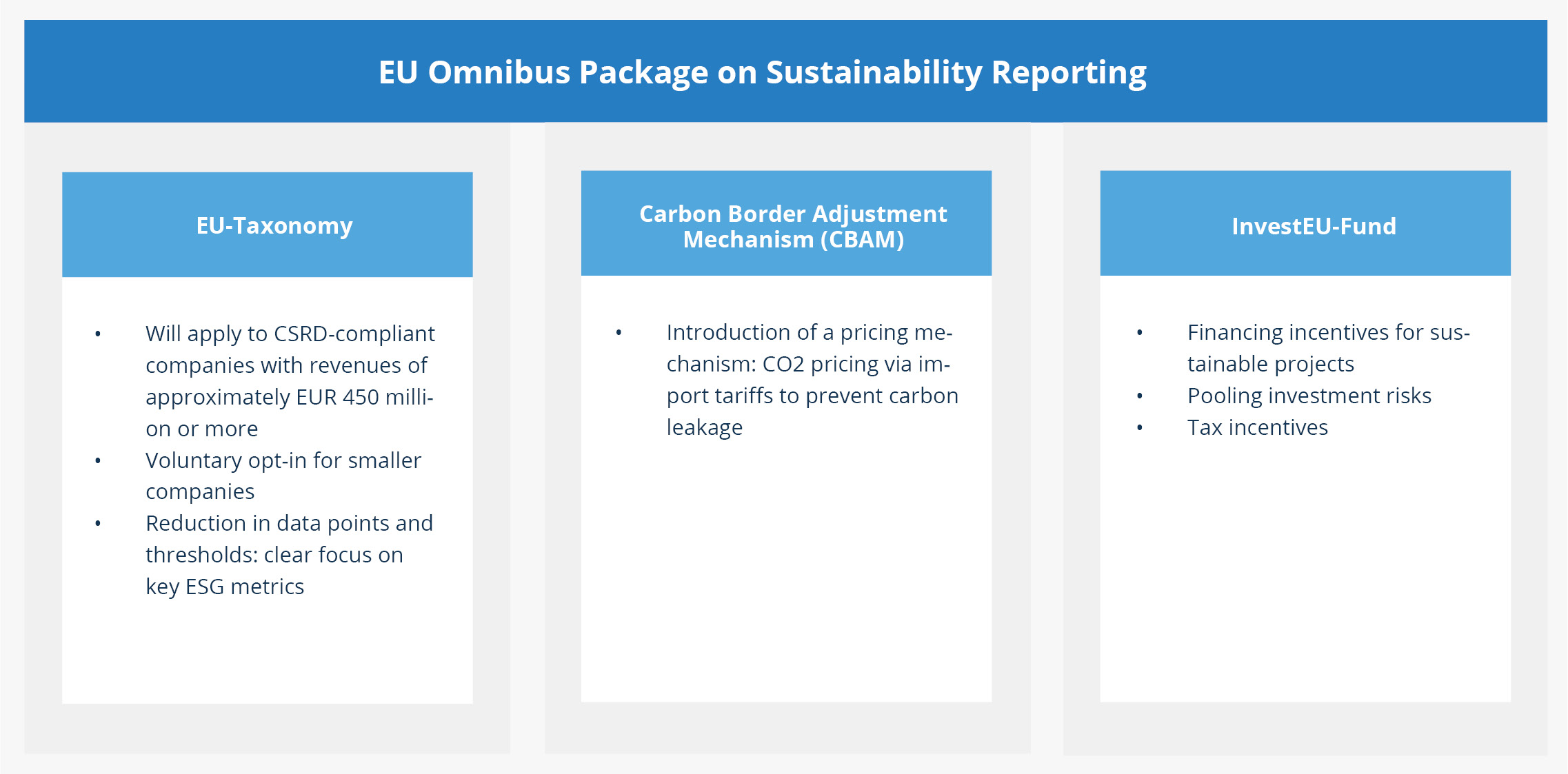
EU Adopts Omnibus Package
Facilitations for CSRD & CSDDD
Sustainability has long since become a central component of modern corporate management. With the so-called omnibus package on sustainability reporting, the European Union is now creating a significant milestone in promoting transparency and corporate environmental responsibility.
Which Companies Will Be Subject to the Application Obligation in Future?
Currently, the >Corporate Social Responsibility Directive (CSRD)for all large companies (defined as companies that exceed two of the following three thresholds: 50 million EUR 50 million net turnover, EUR 25 million balance sheet total, 250 employees) and for SMEs whose securities are listed on a regulated market in the EU. However, many companies and trade associations have suggested that smaller companies should be exempted, as they would be disproportionately burdened with the new reporting obligations. The omnibus package changes the current scope of the CSRD so that it now only applies to companies with over 1,000 employees (i.e., companies with over 1,000 employees and either a turnover of over EUR 50 million or a balance sheet total of over EUR 25 million). These companies are obliged to report in accordance with the European Sustainability Reporting Standards (ESRS), whereby these standards are also being revised and simplified.
What Does the Omnibus Package Mean for Companies in EU Member States?
Focusing on key performance indicators and targeted and practical reporting makes it easier, the administrative burden for companies is reduced, and the reporting process is made more pragmatic.
What Key Changes Does the Omnibus Package Bring with Regard to the CSRD?
The omnibus package introduces various changes to the CSRD to make it more proportionate and easier for companies to implement:
- Less reporting companies: The reporting requirements would only apply to large companies. The number of companies falling within the scope of the CSRD will be reduced by around 80%.
- "Value chain limit": For companies that no longer fall within the scope of the CSRD, the Commission will adopt a standard for voluntary reporting based on the EFRAG SME standard.
- Commitment by the Commission to revise the European Sustainability Reporting Standards (ESRS), significantly reduce the number of data points, clarify provisions that are considered unclear and improve consistency with other legislation.
- Deletion of the standard for obtaining reasonable assurance.
- Deferral of the application of the reporting obligations: The package postpones the application of the reporting obligations for large companies that have not yet started implementing the CSRD and for listed SMEs (waves 2 and 3) by two years ("stop-the-clock").
What Key Changes Does the Omnibus Package Bring with Regard to the CSDDD?
- Companies are given more time by extending the implementation period by one year (until July 26, 2027) and postponing the first phase of the application of the due diligence obligations for the largest companies by one year (to July 26, 2028).
- Companies are relieved of the obligation to systematically carry out in-depth assessments of the adverse effects that occur or may occur in often complex value chains at the level of indirect business partners.
- Other aspects of the due diligence obligations are simplified, for example by extending the interval between two regular assessments and revisions from one to five years.
- The domino effect is further reduced as companies that fall within the scope of the CSDDD may only request the information listed in the voluntary CSRD standard for sustainability reporting (VSME standard) from SME or mid-cap business partners (i.e. companies with a maximum of 500 employees).
- From now on, the various national rules on civil liability will apply, while the harmonized EU conditions for civil liability will be deleted and the obligation of Member States in relation to representative actions by trade unions or NGOs will be removed.
- The requirements for the adoption of transitional mitigation plans are aligned with the CSRD.

In addition to revising the CSRD and CSDDD rules, the EU is also aiming to simplify the EU taxonomy reporting (reduction of reporting data points by 70%), relief in the CO2 border adjustment system (Carbon Adjustment Mechanism, CBAM - exemption of 90% of companies) and new impetus for the InvestEU Regulation (plus EUR 50 billion in additional investments). EUR additional investments).

For far-sighted companies in particular, where digital solutions form a core part of the business, the omnibus package offers not only challenges but also significant opportunities. Companies that focus on sustainable practices at an early stage can use their innovative strength to develop new products and services that offer added value both ecologically and economically.
The fact that the EU is now accommodating smaller companies in particular also fits in with the current tense economic situation. In future, European companies that compete with international competitors, especially those with a high export ratio, will have to shoulder less of the additional burden of environmental reporting. The new EU regulations must now be transposed into national law before another announced omnibus package defines additional requirements in future.
With data analytics solutions, cloud-based tools or integrated financial platforms, reporting processes can be automated and optimized. In addition, these companies can support their customers in achieving their sustainability goals - a strategic advantage that opens up new areas of business in the long term.
Written by

Prof. Dr. Martin Wünsch is an expert in financial reporting and SAP S/4Hana Finance Consulting. He is familiar with this field from various perspectives, e.g., Big4-Audit, Corporate Functions, or Management Consulting. He holds a chair in Business Administration, in particular in Int, Accounting & Controlling, at the FOM University of Applied Sciences Düsseldorf and regularly publishes on current topics in financial reporting.



